If You do a Google Search for ‘Leadership Characteristics’ the First 3 Articles are From The Center for Creative Leadership, Vantage Circle, and Better Up.
Let’s take a look at what they have identified as the most important leadership characteristics.
The Center for Creative Leadership
In their article ‘What Are the Characteristics of a Good Leader?’ they say that there are 10 characteristics of a good leader. They are:
- Integrity
- Ability to delegate
- Communication
- Self-awareness
- Gratitude
- Learning agility
- Influence
- Empathy
- Courage
- Respect
Vantage Circle
In their article, ‘25 Leadership Qualities That Makes You A Good Leader‘, they say that there are 25 characteristics of a good leader. They are:
- Integrity
- Innovative
- Honesty
- Active Listening
- Self-Confidence
- Visionary
- Strong communicator
- Delegation
- Decision Making
- problem-Solving
- Fair attitude
- Inquisitiveness
- Self-motivated
- Humility
- Care for others
- Self-discipline
- Emotional intelligence
- Passion
- Resilience
- Accountability
- Supportive
- Tech-savvy
- Empathy
- Learning agility
- Empowerment
Better UP

In their article, ‘they say that there are 18 characteristics of a good leader. they are:
- Drive
- Resilience
- Integrity
- A desire to learn
- Self-awareness
- Confidence
- Positivity
- Realism
- Creativity
- Communication skills
- Listening skills
- Empathy
- Decision making
- Strategic mindset
- An eye for talent
- The ability to motivate
- The ability to delegate
- Professional expertise
Sticky Learning ® is 7 times more effective than 1-day training courses. Plus, you will get a Chain of Evidence proving your Return on Investment. Discover soft skills training that changes behaviours long term.

What Do We Make of these Leadership Traits?
Commonalities of the Qualities of a Good Leader?
The 4 characteristics that the 3 articles do agree on are; Integrity, delegation, communication, and empathy. This is a good list because it helps us by being short. We can now compare ourselves as leaders and choose one that we need to improve.
Too Many Leadership Characteristics?
The first article suggests that there are 10 leadership characteristics, the second 25 and the third article identifies 18. Everyone has a perspective on what characteristics and qualities make the best leader. The problem is that the list is too long. Where do you even begin?…
Our Challenge?
The challenge we have for the 3 articles above is that 10, 25, or 18 characteristics are too many to define a leader. Yes, I agree that reading those lists, as a leader, I want to be all of those. I want to believe that I am them. Yet, what do I do with that list? Nothing. It will make no difference to my behaviours. It’s a little like writing a list of qualities of a good employee.
There are lots – which ones are more important? Building relationships, as an employee, is more important than being able to use Outlook expertly. There are so many, we need a place to start…
The Single Most Important Characteristic of Effective Leadership?
inc.com, in their article, ‘This Is the Single Most Important Leadership Trait’, According to Hundreds of Founders, says that positivity is the single most important trait for good leaders.
hbr.org, in their article, ‘The best leaders are Versatile Ones’, suggest that versatility is the key characteristic of being a great leader.
At least Inc and the HBR articles identify what it is – positivity and versatility.
Positivity
I can see why that would be chosen as the key characteristic of a leader. A team facing adversity looks to their leader to keep up their spirits. We’ve seen it many a time in films like Al Pacino’s ‘Inches’ speech in the film ‘Any Given Sunday’. Yet, if you were being led by someone in a post-apocalyptic scenario and you had to choose one thing that your leader would be good at, would it be positivity? I doubt it. ‘We are being eaten by zombies but we will get through this’. I think not. Useful, yes, but not the one essential characteristic.

Versatility
Again, I can understand why that would also be chosen, because we want leaders that can adapt to change, as change is constant and we need to meet changing clients’ needs, changing environments, such as Covid. I suppose that if Darwin was right then this is the one essential characteristics, as Darwin suggested that the species that adapts survives. Yet, that’s evolution. We are talking about the here and now of people. Again, useful, yes, but not the one essential characteristic.
Our Perspective on the Best Quality of a Good Leader?
None of the articles above has identified the one true quality of a great leader. The clue is in the name – ‘lead’ to lead. Like manager is to manage.
The dictionary tells us that ‘leadership’ is ‘The action of leading a group of people or an organization.’
The dictionary tells us that ‘to lead’ is to show (someone or something) the way to a destination by going in front of or beside them.
In my opinion, the key leadership characteristic of a leader is to lead. To choose the destination, make the hard choices, and to identify the key things we will achieve this week, this month, or this year is xyz. Not choosing to do it all, but choosing to focus on the few. This is the key quality for any leader. Coming back to our post-apocalyptic example, you need a leader that will choose to lead, making the hard choices that others won’t.
Like Brad?
Those choices split the team, and cause choice paralysis. Like, Brad Pitt in World War Z choosing that his family must stay on the move to survive. He chose that they kept moving. There was no wrong or right choice. No absolutely logical choice that led to the right answer. Only assimilation of the few facts available and then a choice had to be made whether it was right or wrong.
Bad leaders do the opposite of the leading characteristic. They are afraid to make choices and they don’t. But it is better to have made a decision than choose not to make one because that is a decision in itself. Leaders show courage by making choices. Highlighting what is important and galvanising the team behind that vision.
Like a General who chooses when to send the infantry, where to position the artillery, and how the cavalry will attack. Choices that will either win or lose the war. Imagine a poor leading General – ‘When shall we send the cavalry, Sir?’ No response. ‘Why did you send the cavalry then? You got everyone killed and we lost’. Leaders that blame are not leaders. They are leaders with a PhD in hindsight never wanting to be held accountable, so they don’t make decisions.

Like Nelson?
Nelson Mandela chose to stick to his principles despite the consequences. He made a choice. When Steve Jobs came back to a failing Apple, he chose to reduce the number of projects they were working on by -70%. He made that brave choice and stuck by it.
Leaders lead by making choices; what to focus on and what not to focus on. Brave choices. That is the quality of an effective leader.
Action: For even more useful content on leadership, check out our ultimate guide on Leadership Skills.




